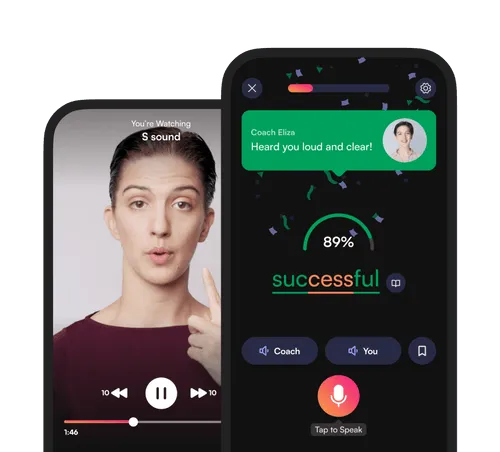Interviews, whether physical or virtual , can be a hard nut to crack and a potential hurdle between you and your career goals.
In these short moments of interaction, you’re trying to sell yourself and prove why you're the best candidate for the role. For non-native English-speaking professionals aiming for career growth in English-speaking environments , knowing how to speak English confidently is crucial.
The tips in this comprehensive guide will help prepare you for your next interview. Let's dive in!
1. Articulation and Pronunciation How you pronounce words makes up your accent and determines whether your interviewer understands you. If you struggle with articulation you might want to consider accent reduction , especially if you do not currently speak like a native English speaker.
For starters, learn to audibly enunciate your words and focus on the correct word stress patterns. Check out this stress exercise you can practice, alongside BoldVoice coach Eliza Simpson.
VIDEO
2. Don't Neglect Grammar While articulation is important in mastering how to speak English confidently in interviews, you should never sideline grammar.
How well do you know your tenses, verb usage, transitional words, and spellings? Speech delivery and accent are important, but it's equally important to mold the foundation.
3. Moderate Your Speech Speed Avoid rushing your speech like you’re attempting to wrap up the interview quickly or speaking too slowly as if you have so much time to spare.
Speaking too quickly can make you sound nervous, while speaking too slowly may portray uncertainty. In other words, the key is finding a comfortable pace that allows you to convey your thoughts clearly and effectively.
Here's Coach Eliza offering some guidance about how to use natural intonation when making statements.
VIDEO
4. Use Simple Terms As you learn how to speak English confidently in interviews, resist the urge to simply show off your complex vocabulary. It’s okay to flex your grammar skills, but sometimes they make you prone to mistakes, especially if you aren’t yet 100% fluent.
You may find yourself struggling to use the right words to relay a message, causing you to stutter. Or worse, you could misuse a complex term and unintentionally reduce your communication skills in the eyes of the interviewer.
Instead of saying: "In my daily workflow, I employ a diverse range of strategies to efficiently tackle tasks and achieve my objectives," say: "I use different strategies to get things done efficiently."
Instead of saying: "My goal in team meetings is to convey my ideas with maximum precision," say: "I want to express my thoughts clearly during team meetings."
Instead of saying: "I dedicate myself to ensuring timely completion of my daily tasks," say: "I work hard to complete my daily tasks on time."
Remember, it's the content of your responses that is the most important. Keep it simple and showcase the skills that matter.
5. Start with the Important Story When approaching a job interview question, begin your answer with what’s relevant. Your response must also be concise, hitting the nail directly on the head as often as you can. Here's BoldVoice Coach Adeola Role on using pitch to convey importance.
VIDEO
In an interview, beating around the bush only makes you appear fidgety and unsure of your capabilities. If you must, take a few seconds to collect your thoughts before diving straight to the answer.
6. Showcase Your Achievements
Do not be afraid to show off your relevant achievements in a well-presented professional manner. An interview is not just a chat with your prospective employers; it is a time to leave lasting impressions.
Especially if you’re not a native speaker, you can build confidence by talking about your achievements, skills, abilities, and experiences.
7. Think Before You Speak
Let's be honest, this is good advice in any context. In an interview, you may not have the luxury of time to carefully compose answers, especially if there are many people to be interviewed. Be that as it may, ensure you weigh your words quickly before answering any question.
We also advise that you practice before attending any interview. As you read further and learn how to speak English confidently in interview meetings, we’ll show you the best practice tips.
8. Maintain Eye Contact Establishing eye contact during an interview exudes confidence and portrays sincerity in American culture. It also demonstrates active listening, showing that you are fully engaged in the conversation.
Additionally, the more you watch your speaker, the easier it is for you to mirror their demeanor.
9. Gesticulate
Know how to express yourself in English in interviews with your hands and body. It's not just what you say; your body language is also a nonverbal way of communicating.
By simply tilting your head or opening your palm, you can emphasize certain words and captivate your audience. To exude confidence, you therefore want to avoid habits like slouching or frowning but rather maintain an upright and friendly appearance throughout the interview.
Watch this short video clip below and notice how the speakers gesticulate to emphasize their words:
10. Stay Calm Maintaining composure during an interview is paramount because nervousness can impede fluency and clear thinking.
Staying calm enhances active listening, allowing for more relevant and thoughtful responses and positive body language. This further complements your spoken words and leaves a lasting positive impression on the interviewer.
Take a deep breath, stay calm, and focus on expressing your ideas clearly.
11. Research the Company
Familiarize yourself with the company's values, mission, and recent achievements. This not only demonstrates your knowledge about the company but also showcases your genuine interest and commitment to the role.
Armed with this knowledge, you can successfully have a confident and reasonable discussion with the interviewer, discussing the alignment of your goals.
12. Understand the Job Description Analyze the job description thoroughly, identifying key skills and requirements. Also, align your experiences and skills with the job specifications and prepare to discuss how you are the ideal candidate.
Be sure to prepare explanations ahead for any concerns that may arise, for instance, why you’re changing career paths or why there is a gap in your resume.
13. Practice Makes Perfect Before you walk into the real deal, prioritize practice to enhance your speaking skills.
You can role-play with a friend or family member to see how well you'll ultimately perform, or consider engaging in minimal pairs exercises if you find yourself struggling with any particular sounds in English.
14. Learn Essential Phrases and Vocabulary Research generic phrases that are often associated with interview settings and learn how to respond to them. Believe it or not, you're not the first to interview for that role, and some templates could prepare you beforehand.
From phrases to questions and simple vocabularies, there’s no limit to how much you can expand your knowledge bank. From interview classics like "tell me about yourself" and "where do you see yourself in five years" to most industry-specific scenario questions, preparing ahead of time will enhance both your confidence and your performance.
15. Never Memorize a Script As you learn and practice how to speak confidently in interviews, do not attempt to memorize a rigid script. First, your script cannot be 100% foolproof and you do not know for sure how your interviewer may approach the interview. Also, memorizing a script tends to make you disoriented, limiting your response when conversations are slightly unfamiliar.
Remember, adaptability is key, especially when mastering how to speak english in front of interviewers. What you should focus on is understanding the mechanism behind speaking or answering questions. This allows for more flexibility and confidence when responding to questions.
16. Do Mock Interviews A pro-tip for how to face interviews with confidence is to practice doing a whole mock interview beforehand.
You can ask a friend to play the role of the interviewer, or use AI technology like BoldVoice's AI Chat to go through an entire round of interviewing, led by an expert AI avatar with questions tailored to your specific field. Your English pronunciation will be graded when you give your answers, so you'll be able to work on your speech clarity as well.
17. Ask for Feedback Seek feedback from friends, mentors, or language professionals to identify any potential challenges as you prepare for an interview. Constructive criticism can help you refine your communication skills.
You can also take advantage of language-training apps like BoldVoice to get real-time feedback as you learn.
18. Self-Assess On your own, you can stand in front of a mirror and watch your mouth and tongue positioning for pronunciation purposes, and you can practice conveying confidence and competence through body language.
You can also leverage your smartphone or any recording device to record your speech for self-assessment before an interview.
Ace Your Next Interview with BoldVoice Mastering confident English speaking in interviews requires attention to speech, accent-related aspects, and broader elements of preparation and presentation. You therefore need to exercise some patience and consistency to attain the level of confidence you desire in your speech.
The BoldVoice app is designed for targeted learning to ameliorate your learning process. With lessons from Hollywood accent coaches, you can refine your accent to attain the confidence that you desire in no time. You can also leverage the app’s AI feature to self-assess and receive real-time constructive feedback for improvement.
Start your 7-day free trial today to refine your accent and build speech confidence so that before you know it, you're acing interviews left and right.









